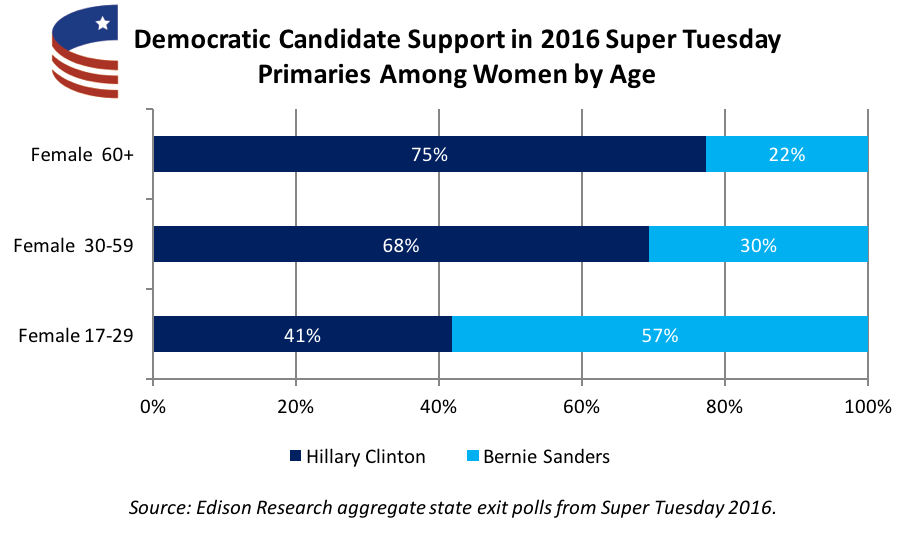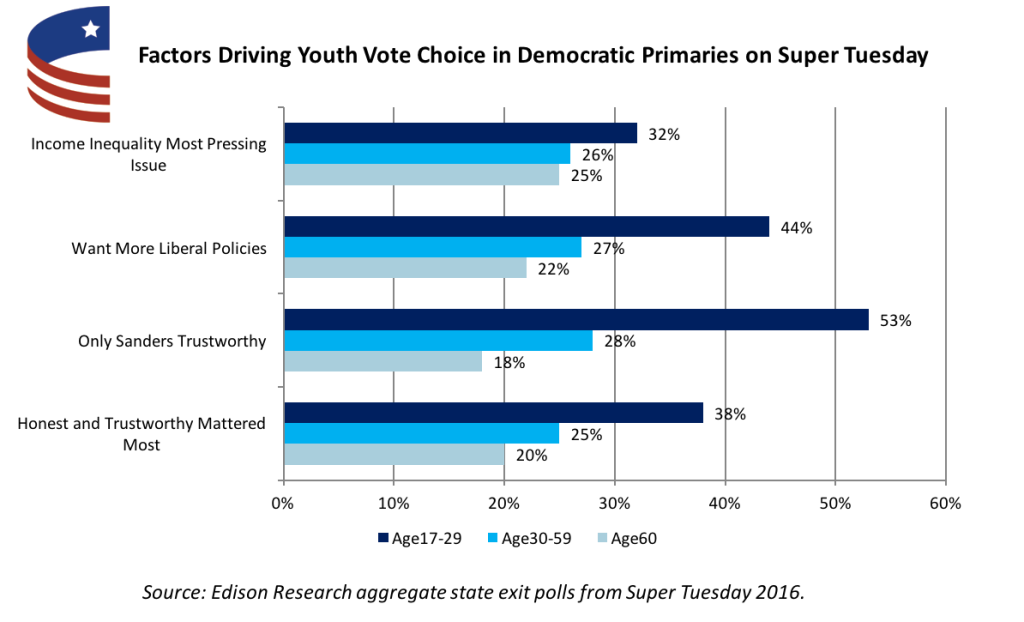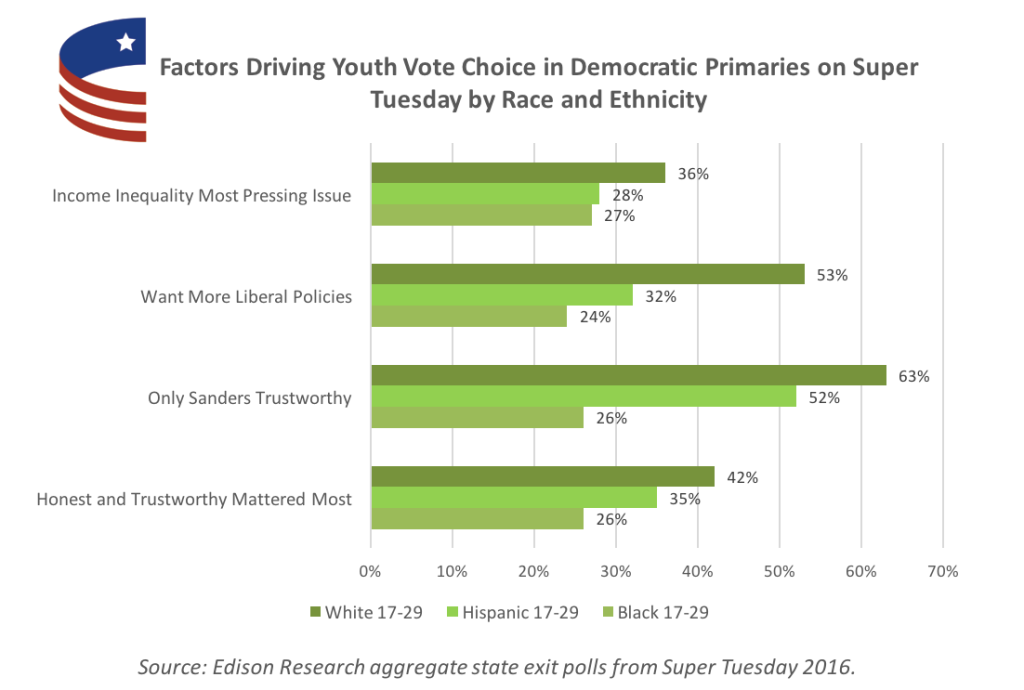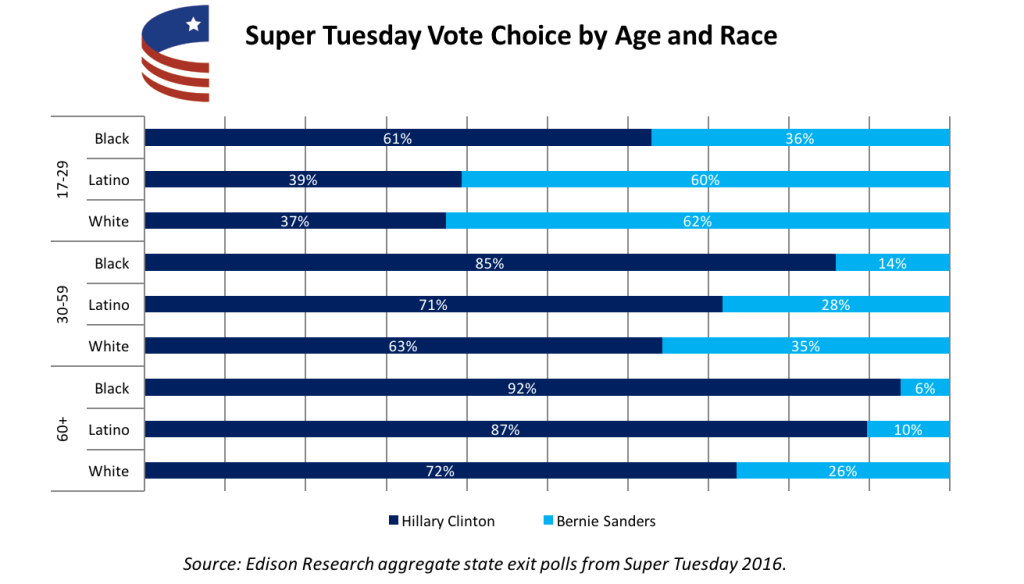Young Women and Non-Black Youth Favored Sanders on Super Tuesday; Issue Priorities Drive Differences in Vote Choice by Age
Although the delegate count remains decidedly in Secretary Hillary Clinton’s favor, the Democratic nomination contest remains competitive, with both Clinton and Senator Bernie Sanders’ campaigns aggressively courting young people where they live, study, and work. As this analysis of Democratic voters on Super Tuesday shows, the results of key upcoming primaries may depend on which of those young people turn out to vote.
Young Women Voted Differently than Older Women
Young women (ages 17-29) who participated in the Democratic Super Tuesday primaries favored Senator Sanders over Secretary Clinton, while older female voters overwhelmingly supported Secretary Clinton, giving her more than 2/3 of their votes.
Young women are an important constituency, particularly for Democrats. In general elections, they usually vote at a higher rate than young men; for instance, 57% of youth votes for President Obama in the 2012 general election came from young women, compared to 43% from young men. However, so far in the 2016 Democratic primaries, young men and young women have made up an equal share of voters, which suggests young men may play a bigger role in this election cycle.
Young Democrats Want More Liberal Policies, and an Honest Nominee
On Super Tuesday, 44% percent of young Democratic primary voters, compared to 28% Democratic voters of all ages, wanted to see more liberal policies rather than a continuation of President Obama’s policies. White youth were the most likely to choose this answer. When asked about the factor that mattered the most in deciding their votes, young Democratic primary voters chose two options, “honest and trustworthy” (38%) and “cares about people like me” (34%), well above other options like “has the right experience” (18%) and “can win in November” (9%). Forty-six percent of Black youth chose “cares about people like me.”
Young Democratic primary voters as a whole were more likely to say only Senator Sanders is honest and trustworthy than older voters, which may go a long way toward explaining his overwhelming support from youth. Young Black voters were more split in their appraisal of which candidate is honest and trustworthy, and young Latinos were more likely than White youth to say both candidates have those qualities. Finally, young Democratic primary voters were more likely (32%) than other age groups to name Income Inequality as the most important issue facing the nation, though “Jobs and Economy” continues to be their top priority (41%).
White and Hispanic Youth Only Groups To Favor Sanders Over Clinton
Voters aged 30 and older, regardless of their race and ethnicity, supported Secretary Clinton by a decisive margin. However, voters under 30 were divided more by race and ethnicity. Senator Sanders, as expected from his performance with youth in predominantly White states before Super Tuesday, won a majority (62%) of the White youth vote, but he also won a majority (60%) of Latino youth vote on Super Tuesday. Meanwhile, a majority (61%) of Black youth voted for Secretary Clinton, though their support for her was not as strong as that of older Black voters.
Who Were the Young Super Tuesday Democratic Primary Voters?
Twelve states held Democratic primaries on March 1, 2016. Edison Research conducted exit polls in nine of those states (AL, AR, GA, MA, OK, TN, TX, VT, and VA). Taken together, the youth who cast ballots in these primary states represented similar proportions of young citizens in the overall population. According to our analysis of the Census data, 58% of young citizens in the Super Tuesday states are White, compared to 60% nationally. Both nationally and in Super Tuesday states, the proportion of Latinos is 17%. African-American youth are slightly more heavily represented in the Super Tuesday states (19%) than nationally (15%).
The Super Tuesday states are also very similar to the overall electorate in regards to educational attainment: (37% in both groups have college degree. Therefore, it’s fair to say that Super Tuesday voting patterns may apply to the primary contests in coming weeks.
Note: Our findings are based on an analysis of a Super Tuesday Democratic aggregated crosstab which was created by Edison Research, which combined all exit poll participants in the Democratic Super Tuesday states. All of the findings are from participants in the Democratic primary contests and do not represent view of Republican primary participants.
Find more analysis in our 2016 Election Center. For regular updates in your Inbox about youth and the 2016 election, sign up for CIRCLE’s monthly E-Update here









